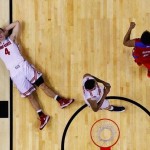 There they are. Screaming wildly. It took three flights to get there, but that was part of the excitement. The anticipation was part of the allure. The journey was just as important as the destination. Unfortunately, they paid for their seats. They didn’t sit once. Each of their faces were haphazardly painted. Hard to be precise, when they were running late. Their parents laughed at their giddiness. They laughed at their parents. Where did they get those IDs? If you can’t be on the team, this has got to be the next best thing.
There they are. Screaming wildly. It took three flights to get there, but that was part of the excitement. The anticipation was part of the allure. The journey was just as important as the destination. Unfortunately, they paid for their seats. They didn’t sit once. Each of their faces were haphazardly painted. Hard to be precise, when they were running late. Their parents laughed at their giddiness. They laughed at their parents. Where did they get those IDs? If you can’t be on the team, this has got to be the next best thing.
This is March Madness. A time when thousands of fans trek across the country to cheer for their teams. Because only one teams win, most fans make the pilgrimage knowing that they will lose at some point. Whether their team wins or loses is not just based on their performance. It is also a function of their draw. Success may be predicated more on who they play, rather than how they play.
Each and every year, we waste precious time filling out brackets. Even the experts, try to predict the outcome. Pick the best conferences. Pick the best players. Pick the best coaches. Most of us just guess. We look at their records. We look at their history. We look at what they have done and what we think they will do. Even the President fills out a bracket. Shouldn’t he be doing something more important?
We believe our logic is pretty sound. That is, we believe it until our brackets are busted. For most us, even though most won’t admit it, our brackets are busted after the first few games. As disturbing as it may be, we don’t predict anything very well. As much as we try to ignore it, we can’t predict what we can’t predict.
Don’t believe me? Let’s look at the evidence. After the first round of the NCAA Division 1 basketball championships, the average seed of the winning team was 6. If every higher seeded team beat every lower seeded team, the average winning team seed should be 4.5. This small difference doesn’t seem significant, until you look a little closer. Three 12 seeds beat three 5 seeds. Two 11 seeds beat two 6 seeds. In the world of scientific probability that should never happen. But, this isn’t science.
After all, the selection committee that determines these seeds are human. They are susceptible to the same biases that we all are. Like us, they don’t know that they can’t predict what they can’t predict. Don’t get me wrong. They do pretty well at predicting predictable success. It is rare for a 16 seed to beat a 1 seed. But, they have no idea where and when the unpredictable successes will occur.
Success pursuit is eerily similar to the NCAA tournament. We do very well at predicting the predictable successes. From the very first time we saw him play, most of us knew Lebron James would be successful. That said, we have a limited ability to predict those unpredictable successes. We don’t know where and when the 12 seeds will beat the 5 seeds. We struggle to understand where and when the 11 seeds will beat the 6 seeds. We don’t know when these unpredictable success will occur.
What does all of this all have to do with you and your success pursuit? If you are a 1 seed, you probably don’t have to worry. Success for you will be very predictable. However, most of us are not number 1 seeds. There are only 4 of those in the NCAA tournament. That’s 6% of all the teams in the tournament. Most of us look more like the 11 or 12 seeds. We struggle just to get in the gym. For us, our success is unpredictable, but entirely possible.
You should not assume that your rank will regulate your success. You should not succumb to your seed. It should not matter where society’s selection committee ranks you. Your success is unpredictable, but it is possible. Like this year’s tournament, your 12 seed puts you in the perfect place to succeed. Go ahead. Bust that Bracket!
Slightly different!
doc mu
